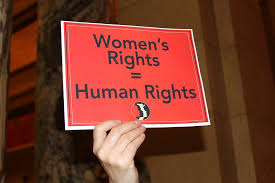
Human rights are the rights that are protected by international law. There are many different examples of human right violations around the world and in history. Throughout history women have had the government laws control what they can do with their own bodies. Women in many parts of the United States are not able to get abortions and unable to control their own bodies.
Abortion is when a woman deliberately terminates her own pregnancy by choice. This procedure is commonly done within the first 28 weeks of pregnancy. The case of Roe v. Wade is something that is very controversial in the U.S. Now because it was a law that helped determine that the right to an abortion was legal. The law was overturned in June of 2022 after being deemed unconstitutional and violating the 14th amendment which gave women the right to privacy. Within the United States, whether abortion is legal or not is based on the individual states opinion. Currently there are 26 states and 3 U.S. territories where abortion is unprotected or illegal. By overturning Roe v. Wade, which for nearly 50 years protected the federal Constitutional right to abortion, the Supreme Court gave states total leeway to restrict abortion or prohibit it altogether (“Abortion Laws by State”). Women usually choose to terminate a pregnancy for many, commonly, unfortunate reasons. Oftentimes being that they are too young to have a child or cannot afford to raise or give birth to a child.
There is a new law that is being created, in certain states that women cannot know the gender of their fetus to have an abortion based on wanting a certain gender. Arkansas, Arizona, Kansas, North Carolina, North Dakota, Oklahoma, Pennsylvania, and South Dakota are all of the states involved with this law. Many women in certain parts of Asiahave done this due to the pressure of wanting to have a son. This started in the early-mid 1970’s, the idea later spreading to parts of India. The new law requires doctors to ask a woman seeking an abortion if she knows the sex of the fetus, and if she does, to tell her that it is illegal to choose an abortion on that basis. It also states that these bans typically name sex, race, and genetic anomaly as prohibited reasons to terminate a pregnancy The law also requires doctors to obtain the medical records that pertain to her pregnancy history. This can be a serious invasion of privacy. People are starting to question if this is a problem that needs to be addressed by the law or if it is just a personal opinion (Gilbert).
In the United States the reproductive rights of women have been taken away from them making women and girls feel unsafe and scared in the US. Women are being restricted from their basic human rights with all of these new abortion bans in the United States. The threat of criminalization in many states has discouraged women and girls from engaging with the health system and seeking prenatal care. Even in places where abortion is legal, the government has made women so paranoid. New abortion laws bring unethical invasions of privacy concerning women getting abortions. With so many states having outlawed abortions, abortion services are now largely inaccessible and have denied women and girls their fundamental human rights to comprehensive healthcare including sexual and reproductive health. The experts said the bans could lead to violations of women’s rights to privacy, bodily integrity and autonomy, freedom of expression, freedom of thought, conscience, religion or belief, equality and non-discrimination, and freedom from torture and cruel, inhuman and degrading treatment and gender-based violence (“United States: Abortion Bans”).
The Planned Parenthood website provides more helpful insight and more information on laws involving abortions. States that passed 20-week bans have forced people into heartbreaking and tragic situations — some needing to end a pregnancy for serious medical reasons, but unable to do so. The 20-week ban is stopping women from terminating a pregnancy after 20 weeks which often ends even before a woman knows she’s pregnant (“Federal and State Bans”).
Works Cited
“Abortion Laws by State.” Center for Reproductive Rights, 16 Aug. 2023, reproductiverights.org/maps/abortion-laws-by-state/.
“Federal and State Bans and Restrictions on Abortion.” Planned Parenthood Action Fund, www.plannedparenthoodaction.org/issues/abortion/federal-and-state-bans-and-restrictions-abortion. Accessed 2 Jan. 2024.
Gilbert, Susan. “Preventing Sex-Selective Abortions in America: A Solution in Search of a Problem.” The Hastings Center, 15 June 2023, www.thehastingscenter.org/preventing-sex-selective-abortions-america-solution-search-problem/.
“United States: Abortion Bans Put Millions of Women and Girls at Risk …” United Nations, 2 June 2023, www.ohchr.org/en/press-releases/2023/06/united-states-abortion-bans-put-millions-women-and-girls-risk-un-experts-say.

